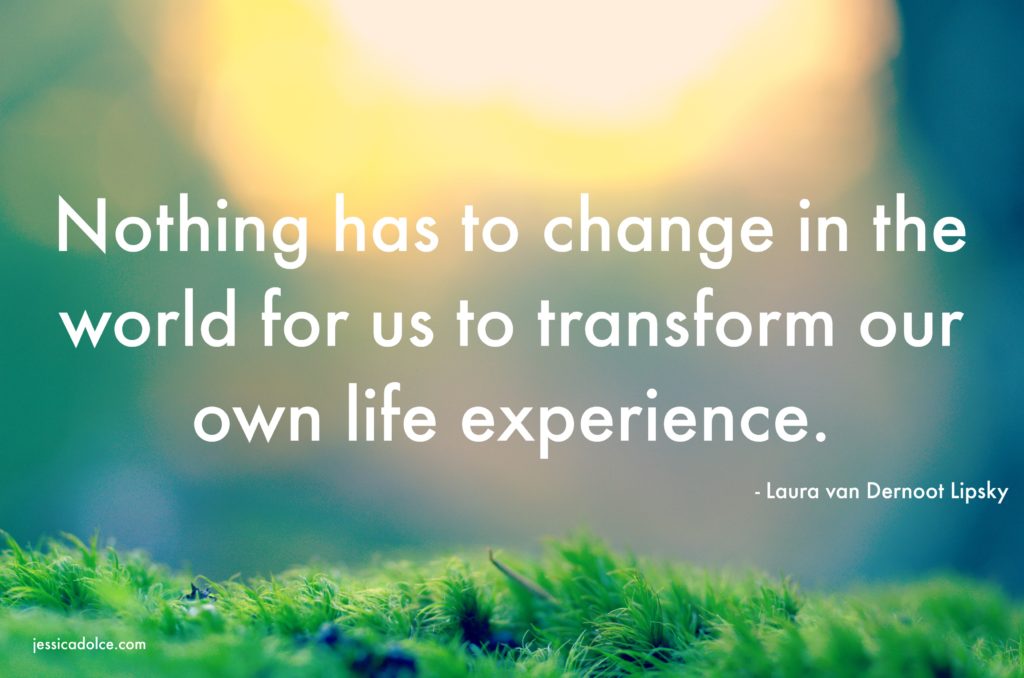What Happened When I Couldn’t Complain for 5 Days

My native language is complaining. I’m also fluent in Bitching, Moaning, and Whining, plus I speak conversational Kvetching.
When a boatload of articles about the negative impact of complaining started coming across my path a few years ago, I perked up.
Essentially, every article was some variation on this theme: complaining keeps us in a negative mindset, feeling like victims, and trains us to be hyper-alert to noticing the bad in any situation.
Complaining may feel good for a moment, but long term it leaves us feeling worse.
A fake workout
Francoise Mathieu, author of The Compassion Fatigue Workbook, refers to bitching, moaning, and whining (the BMWs) as a “fake workout.”
In other words, complaining is the equivalent of sitting on the couch watching someone else workout on TV. At the end, you’re exactly the same as you were before you watched.
Complaining is the same – we feel like we’re doing something because we’re actively talking and discharging energy – but in the end, there are no real results.
We may even feel worse.
In many workplaces complaining becomes the primary way that we communicate and connect. And by workplaces I mean me.
The thing is, there is a LOT to complain about in our work and the state of the world. We’re right to notice and discuss these problems.
But there’s a difference between taking action to improve stuff or a supportive conversation where we share how we’re feeling and the false sense of action we get from complaining.
One gets results or helps us to cope with the inherent difficulties of our work and the other trains us to stay focused on what’s broken and sucks the life out of us.
This SUXS Radio
When complaining is our primary way of experiencing and communicating about the world, it’s as if our mind is stuck listening to a toxic playlist created by a troll.
Let’s call that playlist This SUXS Radio (thanks for the inspiration Anne Lamott!).
And let me tell you, it’s my favorite.
A few years ago, I went on a 5-day silent meditation retreat.
This meant no talking or direct eye contact with other people was allowed.
Silent meals, silent meditation, silent everything…except inside your head. It’s really loud inside your mind.
As if that’s not hard enough, I soon discovered that my room was directly across from the communal bathrooms. I was kept awake half the night by the noise across the hall.
That’s when This SUXS Radio started broadcasting loud and clear.
“Why can’t people close the door more quietly?”
“Why did I get this crappy room?”
“This isn’t fair.”
“Is that sewage I smell?”
“I never should have come here.”
“Meditation is dumb.”
“This SUCKS.”
I found myself physically aching to complain to the woman who was staying in the room next to me, knowing she was likely experiencing the same nightly torture.
For two days I had imaginary conversations with my neighbor about the noise and our stinky rooms. But I wasn’t allowed to talk to her. I couldn’t even make eye contact with her as we walked into our adjoining rooms – no eye roll with a knowing head tilt towards the bathroom.
At night, I had imaginary conversations with my husband and friends. They’d ask me how the retreat went and I’d tell them about the bathrooms! How gross, they’ll say. So disappointing, they’ll commiserate. Validation!
And then something weird happened. After two days of This SUXS Radio, I couldn’t take it anymore.
Not the bathrooms…I couldn’t stand my negative thoughts for one more minute.
I was boring myself. I was making myself miserable. This unique retreat experience that I was grateful to have was going to be defined by my complaints.
So I decided to stop.
Thanks to my mindfulness practices, every time I became aware that This SUXS Radio was coming on in my head, I noticed it and acknowledged it with an inner smirk (Hello again you salty old crone!).
Then I turned the volume down by placing my attention on something else, like my breath.
By day three This SUXS Radio was static in the background. I hardly heard it.
Nothing changed externally. The bathrooms still stunk. I still had a hard time sleeping.
But internally, I changed how I was relating to my experience, letting go of what I couldn’t change or fix, so that I could be at peace.
I was able to do this to a large degree because I didn’t speak my complaints out loud. I did not feed the troll (me. I am the troll).
It’s like an itch. If you can wait it out, the itch usually passes. If you scratch it, the relief lasts a second before the itchiness worsens.
If I had been allowed to talk to my neighbor, I suspect we would have turned the volume up on This SUXS Radio. The complaint, and the negative energy within it, would have grown stronger as we discussed it.
In my five days of silence, I learned that the cliche is true: where we place our attention is where our energy goes.
And that matters. Our attention shapes our entire lives. If we’re always looking for and talking about what sucks, then that will define our experience.
Our life becomes a This SUXS Radio marathon.
Now, this doesn’t mean that there aren’t things worth getting upset about or that we should bottle up our feelings.
Again, there’s constructive talk where you feel upset about an issue, policy, or person’s behavior and you either take action to address that issue directly with the person who is responsible or you healthily cope with your feelings.
And then there’s complaining as a primary way to discharge your discomfort, which ultimately leads to little change and a whole lot of toxicity.
This is especially true at work.
We complain and feed into that negative energy, which only reinforces our focus on what’s going wrong, rather than what we will do to change or let go of it, and prevents us from noticing what’s also going well.
The more we talk about it, the more power we give the complaint and the more we wire our brains to see everything through the lens of This SUXS Radio.
Take a break from complaining
Mathieu writes in her book Compassion Fatigue Workbook, that she and a couple of friends at work deliberately decided to stop gossiping and complaining about work for 3 months.
She reports that the, “…results were striking. We were not necessarily successful at changing our dysfunctional workplace, but we were no longer part of the toxicity and that significantly improved my work experience.”
Lauren Glickman wrote a great article about experimenting with going complaint-free for Animal Sheltering magazine. You can check that out here.
Try it for one week and see what happens.
Turning down the dial on complaining is one way you can improve the quality of your life right now, even if things are far from ideal.
As Trauma Stewardship author, Laura van Dernoot Lipsky, wrote, “Nothing has to change in the world for us to transform our own life experience.”

Want to practice this together?
You have the power to make small, but meaningful changes that can improve the quality of your life, no matter what’s going on at work. Really.
I know many issues need to be fixed, policies need to be changed, people need to behave differently, and resources need to be increased!
AND…even if nothing external changes, you can still transform your own experience.
My online course, Compassion Fatigue Strategies, Plus (it’s about so much more than compassion fatigue) is designed to help people who work with animals do just that.
Early registration discounts have been extended through October 9th!!
Register this week and save $50. Class starts October 21st!
Why Complaining is Literally Killing You
What It’s Like to Go Without Complaining for a Month
Let's Stay Connected.
Sign up for ideas, updates, and your free copy of The ABCs of Self Care Workbook!
I heart boundaries and will never sell your email address. Unsubscribe at any time.


